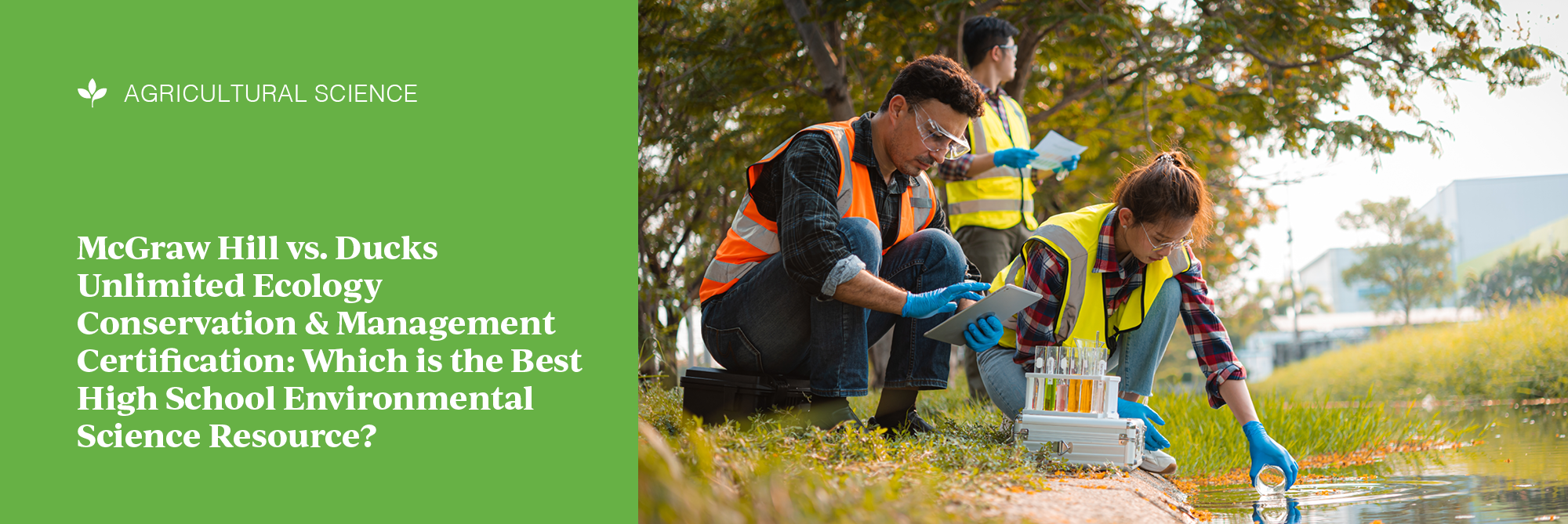Agricultural Science | Industry Certifications
McGraw Hill vs. Ducks Unlimited Ecology Conservation & Management Certification: Which is the Best High School Environmental Science Resource?
After serving as a Texas FFA state officer in 2018, Josh Witherspoon joined the iCEV team as a part-time employee for 3 years before taking on the role of content development specialist in 2022. Witherspoon holds a bachelor's degree in agricultural communications from Texas Tech University, in which his experience and proficiency in writing, marketing and CTE allow him to effectively communicate the successes of CTE educators and students and the value iCEV has to offer.
If you’re looking for high school environmental science resources, you understand the challenge of finding the right one for your students. After all, you’ll use this resource to teach your students valuable environmental science knowledge and skills to take into their futures.
As a developer of environmental science curriculum and certification host, educators often ask us how McGraw Hill’s Principles of Environmental Science 2023 textbook compares to the Ducks Unlimited Ecology Conservation & Management Certification.
In this article, we’ll explore some of the most common questions educators ask when comparing the two resources:
- What are the McGraw Hill and Ducks Unlimited Resources?
- What environmental science topics does each cover?
- What is the instructional format of each resource?
- Who is the intended audience of each resource?
- How much do these resources cost?
By the end of this article, you will have a better understanding of what each resource offers to make the best decision for your students.
1. What Are the McGraw Hill and Ducks Unlimited Resources?
In your search for the best environmental science curriculum, a great first step is to learn about the resource provider and its background. Knowing this information will help you feel more confident when considering what they offer.
What is the Principles of Environmental Science 2023 textbook from McGraw Hill?
McGraw Hill is a learning company that delivers personalized learning experiences intended to improve student learning outcomes. It provides digital and print resources for five disciplines, including the science category, which their environmental science textbook falls into.
The Principles of Environmental Science textbook is a comprehensive introductory resource in which students explore the diverse world of environmental science through exposure to real-world research, hands-on activities, and engineering practices.
What is the Ducks Unlimited Ecology Conservation & Management Certification?
Ducks Unlimited is the largest nonprofit organization dedicated to conserving, restoring, and managing wetlands and associated habitats for North America's waterfowl. In the spirit of sharing their passion and knowledge of environmental science and ecology with the next generation, they created the Ducks Unlimited Ecology Conservation & Management Certification.
This certification, hosted on the iCEV Testing Platform, verifies individuals’ knowledge and skills in the areas of ecological principles and wildlife management, including habitat, forest, grasslands, wetlands, and waterfowl conservation and management. In addition, iCEV offers a certification preparation course curriculum to set your students up for success on the certification exam.
2. What Environmental Science Topics Does Each Cover?
Another important factor to consider is what topics the resource you’re investigating covers. In this section, you’ll learn what topics you can teach when implementing McGraw Hill and the Ducks Unlimited certification curriculum.
Environmental Science Topics You Can Teach With the McGraw Hill Textbook
The textbook is split into 11 chapters across 4 units including:
- Unit 1: Studying the Environment
- Nature of Science
- Understanding Our Environment
- Unit 2: Ecology and the Natural World
- Environmental Systems: Matter, Energy, and Life
- Evolution, Species Interactions, and Biological Communities
- Population Dynamics
- Unit 3: Resources from Air, Water, and Land
- Climate
- Water: Resources and Pollution
- Environmental Geology and Earth Resources
- Energy
- Unit 4: Sustainability and Environmental Policy
- Environmental Health and Toxicology
- Solid and Hazardous Waste
- Environmental Policy and Sustainability
Within these chapters, students engage with resources, including unit projects, authentic case studies, models, and more. In addition, educators can opt to purchase the high school teacher manual, which includes instructional, pacing, and differentiation strategies.
Environmental Science Topics You Can Teach With the Ducks Unlimited Certification Preparation Materials
The Ducks Unlimited Ecology Conservation & Management Certification exam consists of 100 questions and assesses knowledge and skills from the following four weighted industry standards:
- Ecological Principles - (20%)
- Ecological Systems
- Ecological Succession
- Monitoring & Sustaining Ecosystems
- Wildlife Conservation & Management - (30%)
- North American Model of Wildlife Conservation
- Population Ecology
- Management Plans
- Species Identification - (10%)
- Non-Game Animals
- Predators & Furbearers
- Game & Upland Birds
- Waterfowl
- Habitat Conservation & Management - (40%)
- Types of Habitats
- History of Conservation
- Benefits, Threats, Legislation & Conservation Management of Forests, Grasslands and Wetlands
iCEV offers a certification preparation curriculum for the Ducks Unlimited Ecology Conservation & Management Certification designed to expose students to and help them master the industry standards tested for in the certification exam.
By understanding what standards candidates will be tested on, you’ll be better able to prepare your learners effectively. In addition, since each industry standard is weighted, it’s a good idea to spend additional time on standards with a higher percentage of questions on the exam. For the full breakdown of skills and knowledge, students will learn , view the study guide.
3. What Is the Instructional Format of Each Resource?
The next factor to consider when choosing a resource for your classroom is its instructional format. After all, some options may be designed with specific teaching styles or environments in mind, and you’ll want to choose the option that best supports you and your students.
Instructional Format of the McGraw Hill Principles of Environmental Science 2023 Textbook
As a digital textbook, Principles of Environmental Science is enriched with multimedia content and adaptive, personalized learning features to ensure students of all learning styles and capabilities can access and engage with the curriculum.
Materials you’ll find within this resource include:
- Interactive eTextbook
- Unit projects, including case studies, labs, and practice activities
- Realistic, three-dimensional figures and models
- High School Teacher Manual, including pacing strategies
The variety of methods used exposes students to environmental science knowledge and skills, discover critical topics within each unit, and apply what they’ve learned throughout the course.
Instructional Format of the Ducks Unlimited Ecology Conservation & Management Certification Preparation Materials
iCEV’s Ducks Unlimited Ecology Conservation & Management Certification preparation materials
Materials you’ll find within the prep curriculum are reviewed and updated annually and include:
- A pre-test to assess student comprehension before instruction
- Lesson plans that provide step-by-step guidance for instructors
- A Strategies for Success lesson which outlines how exactly to set students up for success
- Media-rich presentations and video to keep students engaged
- Projects and activities designed to increase information retention
- Formative assessments to gauge student understanding throughout a unit
- Certification exam to assess student mastery of the industry standards
As a comprehensive curriculum solution, iCEV’s courses provide both structure and flexibility for teachers and students during the learning process. In every iCEV course, you’ll find up-to-date information and resources aligned to state and national standards. These resources are delivered in a way that keeps students engaged and teachers well-equipped to meet student needs.
4. Who Is the Intended Audience of Each Resource?
Every curriculum option is unique in design and intended audience. In your search for the best environmental science curriculum solution for your students, it’s essential to remember who the curriculum is designed for. Knowing this will help you better meet your students’ needs and your instructional goals.
Intended Audience of McGraw Hill Resource
McGraw Hill’s Principles of Environmental Science textbook is a good fit for high school environmental science teachers looking for a comprehensive, introductory curriculum to teach the fundamental knowledge and skills necessary to explore environmental science.
However, for teachers looking for a more engaging curriculum, there may be better choices than this textbook. While textbooks can be comprehensive, they often fall short when it comes to exciting students and keeping them engaged. Unless you pursue the additional materials offered alongside the textbook, your students may struggle with disengagement.
Intended Audience of the Ducks Unlimited Certification
This certification is designed for students in grades 9-12 and is also used to upskill individuals already in the workforce. Those who earn the certification are more qualified and prepared to enter highly-specialized roles within the industry.
The Ducks Unlimited Ecology Conservation & Management Certification is a good fit for educators looking for a semester-long, comprehensive environmental science resource to challenge students and give them an opportunity to add to their professional resume.
Its important to keep in mind that to implement this certification, educators must be subscribed to iCEV’s agriculture science subject area. With a single subscription you gain access to all of iCEV’s comprehensive agriculture science curriculum.
5. How Much Do These Resources Cost?
Cost is a substantial factor when choosing the best environmental science resource for your classroom. In this section, you’ll learn the different pricing options for both providers and what factors influence their costs.
Cost of the Principles of Environmental Science textbook from McGraw Hill
McGraw Hill offers a wide variety of curriculum packaging options, including multi- and single-year subscriptions for teachers and students, as well as bundle pricing. Bundle options include the textbook, lab/teacher manual, and subscription at one flat rate depending on your subscription length.
A one-year teacher subscription for McGraw Hill’s Principles of Environmental Science textbook costs $212.20, while a one-year student subscription costs $82.24. Additional resources accompanying the textbook include the Student Lab Manual at $44.76 and the Teacher Manual at $57.64.
Cost of the Ducks Unlimited Ecology Conservation & Management Certification
Teachers can expect to pay $40 per certification voucher per student. In addition, access to the prep materials for the Ducks Unlimited Ecology Conservation & Management Certification comes with an iCEV subscription.
When implementing this certification, educators must be subscribed to the iCEV agriculture science subject area. Agriculture science curriculum subscriptions start at $1,500 and include 25 student licenses. With your single subscription you gain access to over 20 comprehensive high school agriculture courses and a wide range of curriculum including access to preparation materials.
Which Environmental Science Resource Is Right For My Students?
In this article, you’ve discovered some key differences between McGraw Hill’s Principles of Environmental Science 2023 textbook and the Ducks Unlimited Ecology Conservation & Management Certification.
In short, McGraw Hill’s resource is a great choice for educators seeking a comprehensive introductory environmental science resource. However, as a textbook, this resource lacks the engaging components that bring learning to life.
On the other hand, if you’re looking for a supplemental resource to challenge students and give them an opportunity to add to their professional resume, the Ducks Unlimited Ecology Conservation & Management Certification is a strong choice.
Think the Ducks Unlimited Ecology Conservation & Management Certification is right for your students and classroom? As an educator you can earn the Ducks Unlimited Ecology Conservation & Management Certification for FREE to understand what implementing this certification in your classroom will look like.


